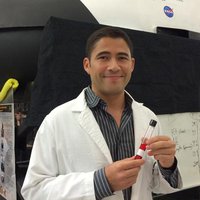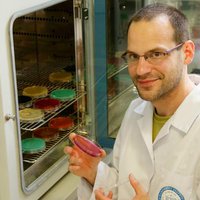"Several painful years can pass from the time the first symptoms of arthritis begin to appear until the doctor can confirm the specific type of arthritis suffered by the patient. There are many varieties of this illness which affects one out of every five adults and represents the main cause of disability in the elderly. In most cases, the patients must wait, their symptoms advancing all the while, until their physician can determine the specific type of arthritis at hand, during which time damage caused can prove irreparable.
This is the situation Thibault Helleputte aims to prevent through his development of RheumaKit, the first molecular test capable of diagnosing arthritis in its early phases and thereby improving the quality of life for those affected by the disease. Having a firm diagnosis is fundamental: the treatment for rheumatoid arthritis is useless against osteoarthritis, two of the most common strains of arthritis, both of which can be more precisely diagnosed using Helleputte´s test.
“When a doctor wants to treat a patient suffering from arthritis in its early stages without a firm diagnosis for lack of more advances symptoms, he can perform a biopsy and use Rheumakit,” the researcher explains. The biopsy obtains a sample of the synovial fluid, a substance produced by the body to lubricate our joints, which is introduced into a collection and transport kit and sent to the lab. There the sample undergoes molecular analysis to measure the genetic activity using 100 different markers. DNAlytics, the company founded by Helleputte, then notifies the physician that the test results are available.
The specialist can then use DNALytic´s online platform to introduce additional diagnostic information which allows the platform´s algorithms to refine the analysis performed on the molecular sample. The result is a report detailing the probabilities of the patient suffering each variety of arthritis. In the case of rheumatoid arthritis, this process yields a success rate of over 90%. With this information the physician can initiate treatment up to 3 years earlier than they could have using traditional diagnostic techniques.
Helleputte got his start within the field of medical bioinformatic analysis during his doctorate work, which he completed at the Catholic University of Louvain (Belgium) in 2010. In 2012 he founded DNAlytics to continue the work he began at the university and to provide medical consulting and biomedical analysis services, but he soon decided to apply his experience to the development of diagnostic tests. Using the tissue samples and clinical histories of donors along with their eventual diagnoses, he was able to develop and calibrate Rheumakit, which was officially approved for widespread use in 2014.
“Currently we are working on incorporating further characteristics into our online platform, such as personalized therapeutic recommendations”, the CEO of DNAlytics explains. Despite having a precise diagnosis, not every treatment bears results. Thanks to Helleputte´s tests, personalized treatments can help to palliate this challenge. The goal is twofold: to provide improved medical attention for arthritis patients and at the same time avoid incurring unnecessary costs for the healthcare system by applying ineffective treatments.
In the words of Jonathan Weitzmann, Professor and head of the Genetics and Epigenetics Department at the University of Paris Diderot (France) and jury member for the MIT Technology Review Innovators Under 35 Belgium awards, Thibault Helleputte “is prudently and solidly tackling the integration of data anlaysis with diagnostics and patient care”."




